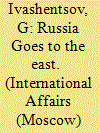|
|
|
Sort Order |
|
|
|
Items / Page
|
|
|
|
|
|
|
| Srl | Item |
| 1 |
ID:
131865


|
|
|
|
|
| Publication |
2014.
|
| Summary/Abstract |
THE YEAR 2013 has to a very large extent become a year of Asia for Russia. The 2012 summit of the Asia Pacific Economic Cooperation forum (APEC) in Vladivostok was followed this year by Russian-Chinese and Russian-Indian summits in Moscow in March and October, 2013. Vladimir Putin's participation in the APEC summit in Bali, Indonesia, in September, his November visits to Hanoi and Seoul, Russian-Japanese negotiations in a "2+2" format (foreign and defense ministers), and a number of other top and high-level meetings, showing that the Asia Pacific region is gaining ground in Russia's policy.
|
|
|
|
|
|
|
|
|
|
|
|
|
|
|
|
| 2 |
ID:
169595


|
|
|
|
|
| Summary/Abstract |
From the early 1970s until Muammar Qadhafi's toppling in 2011, Moscow and the Libyan Jamahiriya enjoyed cordial relations. During the Cold War, Libya played an important role as the forward base of Soviet interests in the Mediterranean. Although Moscow and Tripoli never entered into a formal alliance, Soviet military instructors were frequent guests in Libya, its military was equipped with Soviet weapons, and Qadhafi was supportive of Moscow's highly‐advertised efforts to back anti‐colonial and anti‐imperialist struggle around the globe. Even more important, both nations enjoyed substantial economic cooperation. The relationship became strained in 1992, however, as the government of the newly established Russian Federation joined the international sanctions regime against Libya. Yet, with the exception of this brief intermezzo, Qadhafi's friendly regime was perceived by Russia's foreign‐policy makers as an important asset in the Mediterranean.
|
|
|
|
|
|
|
|
|
|
|
|
|
|
|
|
| 3 |
ID:
142176


|
|
|
|
|
| Summary/Abstract |
The rise of the Islamic State in Syria and Iraq (ISIS, ISIL or IS) has once again brought the Middle East to the center of the international stage. This quasi-state's recent territorial gains, together with its harsh treatment of religious minorities, brazen media campaign and destruction of the region's unique cultural heritage, have all galvanized millions in the region and across the world against the group. The unprecedented number of youth from countries across the Muslim world as well as from Western diasporic communities volunteering to join ISIS has generated enormous security concerns for the governments of jihadists’ home countries. It is believed that the subsequent reemergence of a large and increasingly dedicated, experienced and unified transnational jihadist force poses a challenge not only to regional security in jihadists’ home countries, but also to key Western nations engaged in combatting the Islamic State and similar groups around the world.
|
|
|
|
|
|
|
|
|
|
|
|
|
|
|
|
| 4 |
ID:
092505


|
|
|
|
|
| Publication |
2009.
|
| Summary/Abstract |
Russia and OPEC are major oil producers. Considering the growing energy demand for the global economy, both parties are consistently increasing their exports of hydrocarbons and developing new supply capacities. Meanwhile, both parties have a mutual interest in creating a stable market by cooperating. However, the likelihood of Russian cooperation with OPEC is largely a function of oil prices and the political relations between Russia and OPEC countries. The following article deals with the relations between Russia and OPEC since the collapse of the USSR to the economic crisis in 2008. The author examines the political, cultural and economic conflicts between the two parties and their different attitudes toward the oil market in order to assess their chance to fully cooperate in the long term.
|
|
|
|
|
|
|
|
|
|
|
|
|
|
|
|
|
|
|
|
|